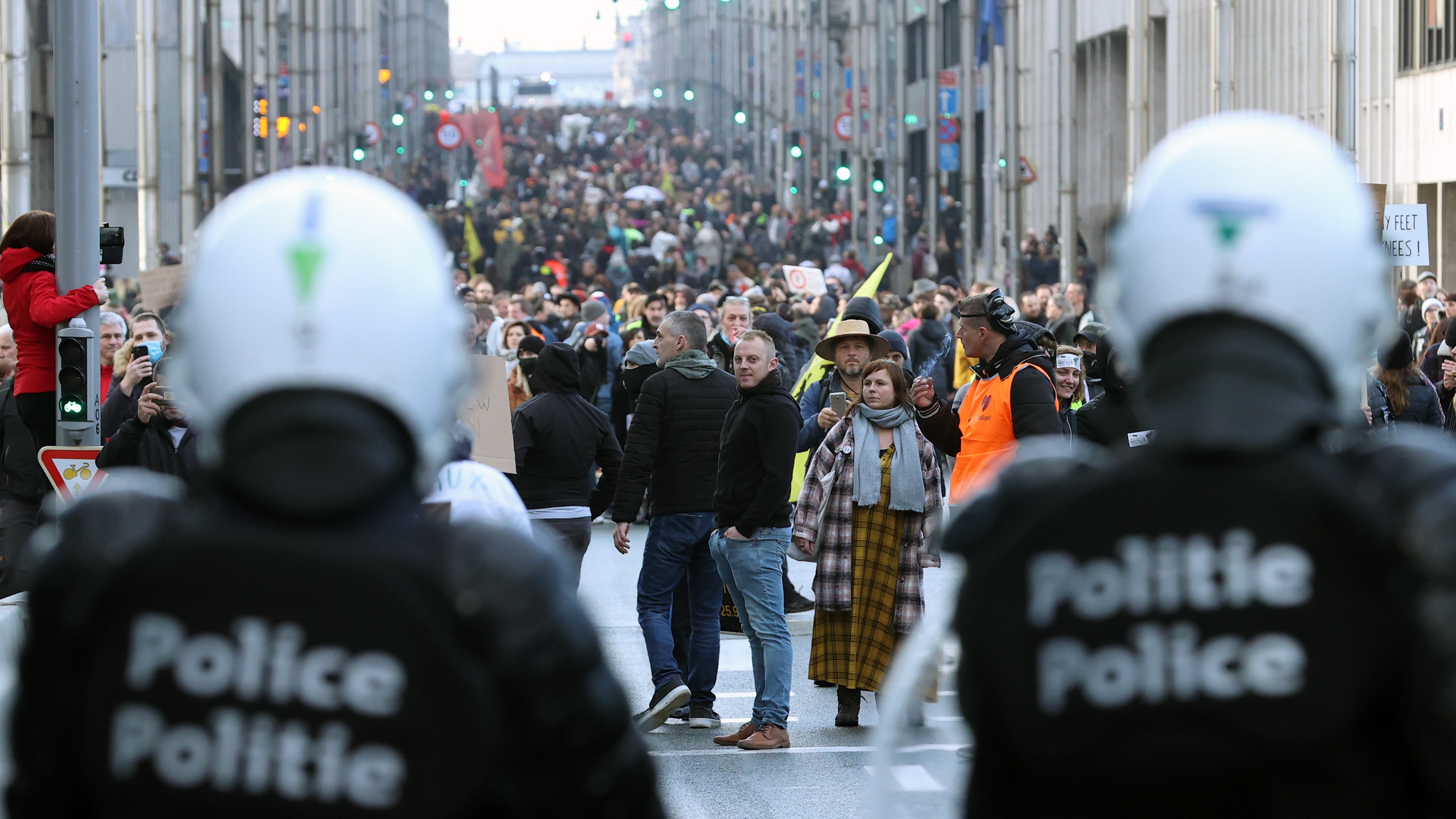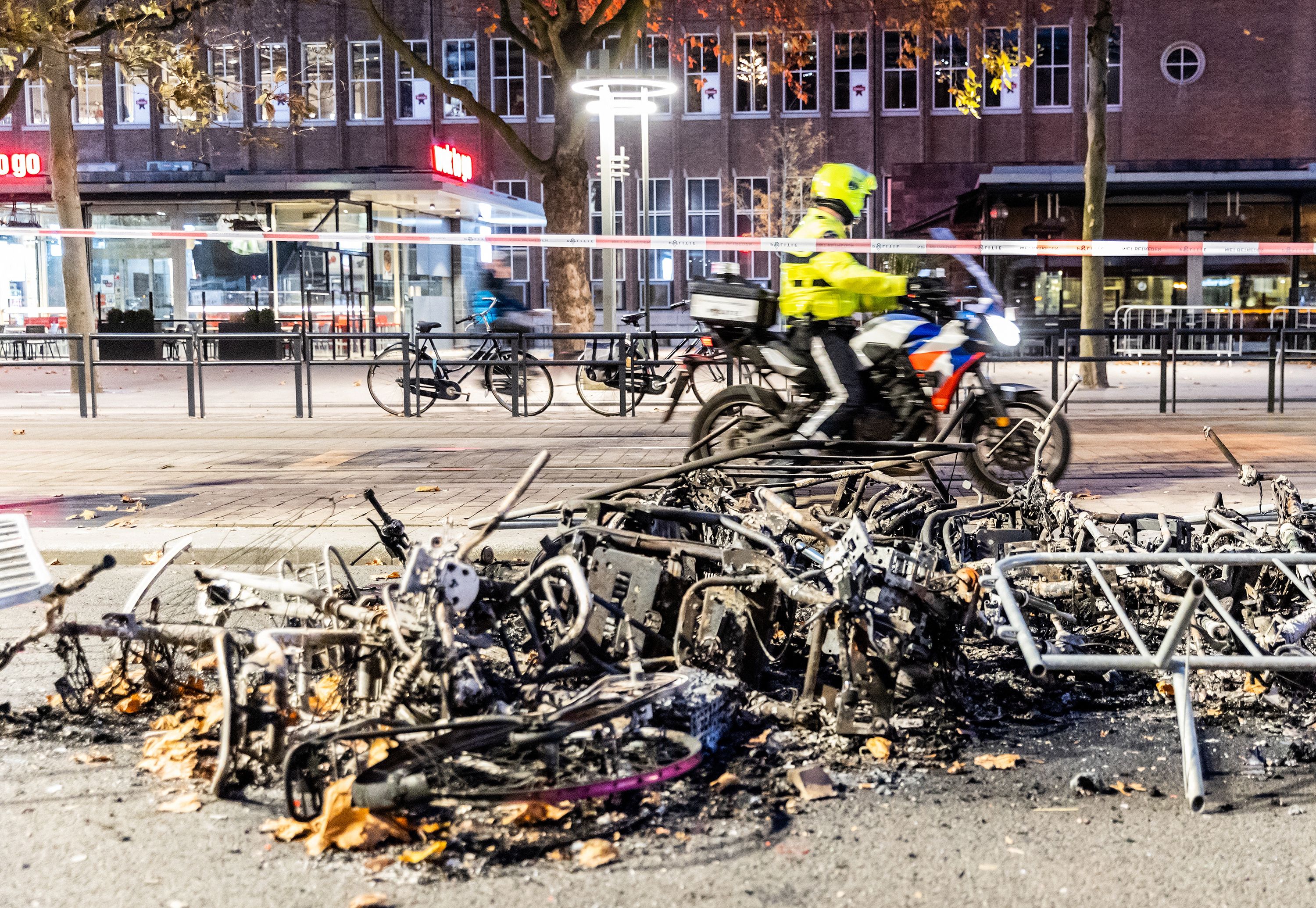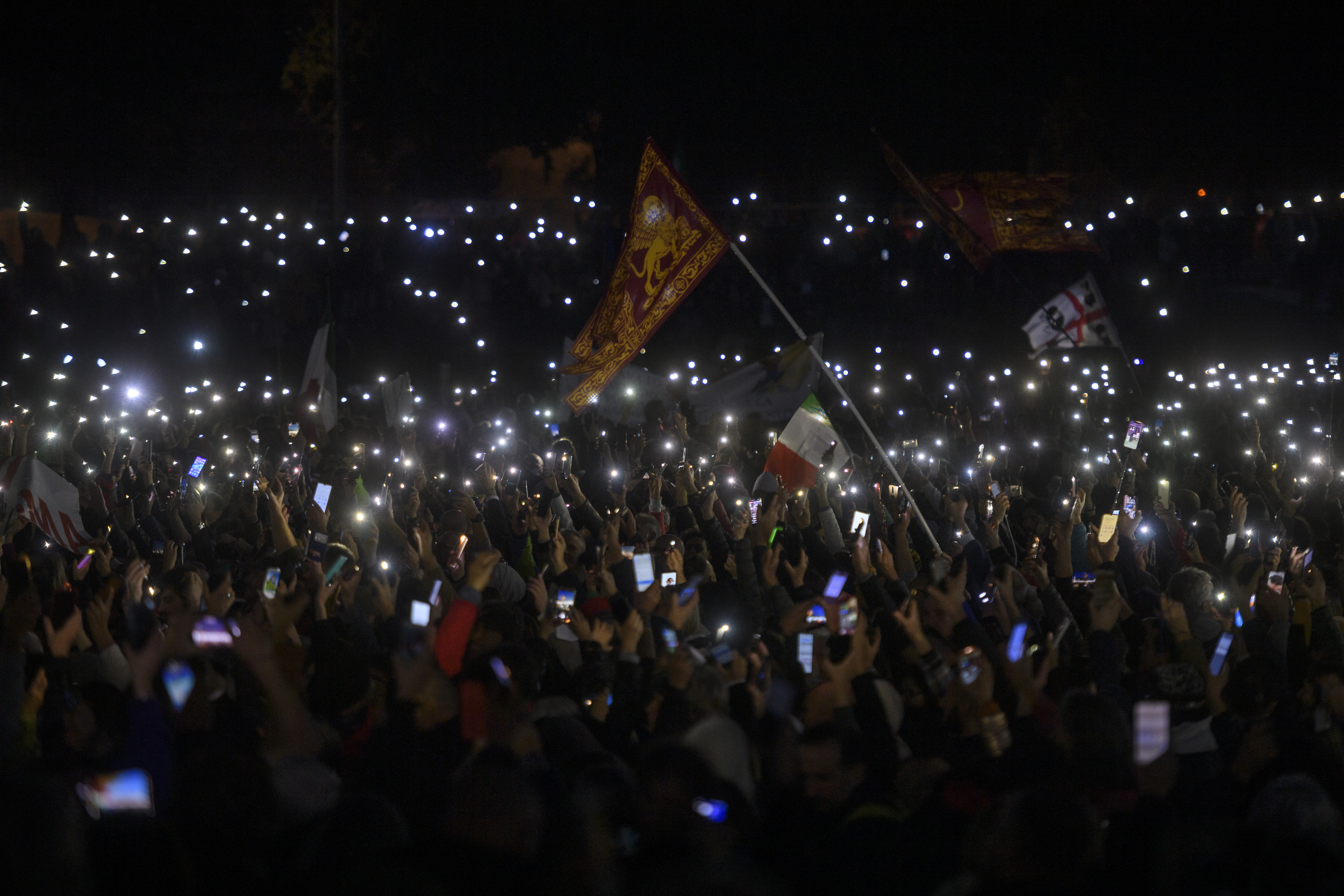How the world reported Europe’s eruption of anti-lockdown protests
Tens of thousands rally in violent demonstrations against new Covid-19 restrictions

A free daily email with the biggest news stories of the day – and the best features from TheWeek.com
You are now subscribed
Your newsletter sign-up was successful
European capitals have been rocked by protests as thousands swarmed on to the streets to voice their opposition to new lockdown restrictions aimed at curbing spiralling infection rates across the continent.
In Brussels, police “fired water cannons and tear gas” on the crowds after “being pelted with projectiles as 35,000 protesters challenged Belgium’s beefed up anti-Covid measures and vaccination campaign”, The Times reported.
Police in the Netherlands “made 19 arrests after riots in The Hague on Saturday night when officers charged protesters who set fire to bicycles”, the paper added. Authorities also made “51 arrests and are alleged to have shot protesters” in Rotterdam on Friday.
The Week
Escape your echo chamber. Get the facts behind the news, plus analysis from multiple perspectives.

Sign up for The Week's Free Newsletters
From our morning news briefing to a weekly Good News Newsletter, get the best of The Week delivered directly to your inbox.
From our morning news briefing to a weekly Good News Newsletter, get the best of The Week delivered directly to your inbox.
According to The Brussels Times, the demonstration in the Belgian capital “turned violent when a group turned off the route previously agreed by organisers and city authorities”.
While “the full extent of the damage caused by the riots is still unclear”, video footage posted on social media showed “protesters vandalising cars, shop windows, street furniture and private property”, the paper added.
In what Rotterdam’s mayor later described as an “orgy of violence”, a press photographer told De Telegraaf that dozens of shots were fired by the police, adding that “there were shells everywhere on the ground”.

The Amsterdam-headquartered paper described how “hundreds of demonstrators gathered” to protest against the introduction of so-called “2G” restrictions under which “people can only receive a coronavirus pass if they have been vaccinated or recently recovered”.
A free daily email with the biggest news stories of the day – and the best features from TheWeek.com
“Protesters set off fireworks and set fires in the streets,” the paper said, adding that “four police cars went up in flames” and “mopeds, waste bins and other street furniture were also set on fire or thrown up as barricades”.
Demonstrations “against virus restrictions also took place in Switzerland, Croatia, Italy, Northern Ireland, Austria and North Macedonia on Saturday”, the Daily Mail said.
SwissInfo reported that “around 2,000 people from different Swiss regions took part in a protest” in the capital, Zurich.
The event was “organised by the Mass-Voll [Moderate] movement”, which advocates for an end to all Covid restrictions, “accompanied by groups such as the Freie Linke [Free Left] and Aktionsbundnis Urkantone [Action Alliance]”.
Unlike the events in Belgium and the Netherlands, the “demonstrations were without incident”, the site added. But the protest came as the Covid situation in Switzerland “worsened”, with “6,200 new cases, 15 deaths and 64 people hospitalised” on Friday.
Thousands gathered in the Croatian capital Zagreb, Al Jazeera reported, “carrying flags, nationalist and religious symbols, along with banners against vaccination and what they describe as restrictions of people’s freedoms”.
French Interior Minister Gerald Darmanin was also forced to “condemn violent protests in the Caribbean island of Guadeloupe, one of France’s overseas territories”, the broadcaster added.
Demonstrators had “blocked roads and set fire to cars, protesting against France’s Covid-19 health pass required for restaurants and cafés, cultural venues, sport arenas and long-distance travel, as well as mandatory vaccinations for healthcare workers”.
Vienna-based paper Kronen Zeitung said “several thousand people” marched through the eastern city of Bregenz on Sunday “armed with cowbells, whistles and drums”. The protesters voiced their anger at “mandatory vaccination and other corona measures”.
Austria imposed a lockdown for the unvaccinated last week, but rising infections later saw the government enact a full lockdown to curb the spread of the virus.
Posters carried by demonstrators read: “When right becomes wrong, resistance is compulsory”; “Compulsory vaccination? My body, I decide!”; “We want our basic rights back! No compulsory vaccination” and “Vaccination fascists”.
Deutsche Welle (DW) said 30,000 people also took part in a rally in Vienna that resulted in “ten arrests, all for violating Covid-19 restrictions or use of banned Nazi symbols”.
“Three young Austrians from Linz” were arrested after admitting to a plan to “ambush police officers during the planned protests, given their dissatisfaction with tighter restrictions”, DW said. Two of the teenagers also said they hoped to “set officers on fire”.
Protesters “gathered at the Circus Maximus in Rome” for “the 18th consecutive weekend of protests against Italy’s coronavirus certificate”, reported The New York Times.

The Italian government has already introduced a passport, known as a ‘green pass’, “that must be shown to enter workplaces as well as restaurants, museums, football matches and public events”, The Times added.
In October, a demonstration in Rome “against the scheme turned violent as demonstrators linked to the far right group Forza Nuova stormed the headquarters of a union that backed the passport”.
Central to the protests is “anger at mandatory testing or increasing use of compulsion in workplaces and social settings”, The Irish Times said, adding that “understanding the political alienation manifest in the riots” means recognising the link between “mistrust in government and institutions and low vaccination rates”.
“Mainstream parties throughout Europe have yet to understand how to tackle that,” the paper warned.
The Telegraph said the violence has “increased debates in Germany and other European countries about the possible introduction of compulsory immunisations” as low jab rates prompt “fears a new wave of infections could once again cripple the continent”.
In the UK, Health Secretary Sajid Javid said the “one big difference” between Britain and parts of the continent where infections are spiking is the UK’s vaccine booster programme, adding: “It’s the most successful of Europe.”
-
 6 of the world’s most accessible destinations
6 of the world’s most accessible destinationsThe Week Recommends Experience all of Berlin, Singapore and Sydney
-
 How the FCC’s ‘equal time’ rule works
How the FCC’s ‘equal time’ rule worksIn the Spotlight The law is at the heart of the Colbert-CBS conflict
-
 What is the endgame in the DHS shutdown?
What is the endgame in the DHS shutdown?Today’s Big Question Democrats want to rein in ICE’s immigration crackdown
-
 Epstein files topple law CEO, roil UK government
Epstein files topple law CEO, roil UK governmentSpeed Read Peter Mandelson, Britain’s former ambassador to the US, is caught up in the scandal
-
 Iran and US prepare to meet after skirmishes
Iran and US prepare to meet after skirmishesSpeed Read The incident comes amid heightened tensions in the Middle East
-
 Grok in the crosshairs as EU launches deepfake porn probe
Grok in the crosshairs as EU launches deepfake porn probeIN THE SPOTLIGHT The European Union has officially begun investigating Elon Musk’s proprietary AI, as regulators zero in on Grok’s porn problem and its impact continent-wide
-
 Israel retrieves final hostage’s body from Gaza
Israel retrieves final hostage’s body from GazaSpeed Read The 24-year-old police officer was killed during the initial Hamas attack
-
 China’s Xi targets top general in growing purge
China’s Xi targets top general in growing purgeSpeed Read Zhang Youxia is being investigated over ‘grave violations’ of the law
-
 Panama and Canada are negotiating over a crucial copper mine
Panama and Canada are negotiating over a crucial copper mineIn the Spotlight Panama is set to make a final decision on the mine this summer
-
 Europe moves troops to Greenland as Trump fixates
Europe moves troops to Greenland as Trump fixatesSpeed Read Foreign ministers of Greenland and Denmark met at the White House yesterday
-
 Why Greenland’s natural resources are nearly impossible to mine
Why Greenland’s natural resources are nearly impossible to mineThe Explainer The country’s natural landscape makes the task extremely difficult